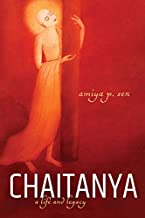Amiya Sen calls his book Chaitanya: A Life and Legacy: 1) a biography of Chaitanya, 2) a story that he has ‘narrated to himself’1 as a historian and ‘not as a scholar of religious studies’2, 3) a ‘not so serious yet reflexive’3 work which he believes will not please either the pious Vaishnava (‘for a palpable lack of faith’4) or a probing scholar (for the lack of application of ‘rigorous scholastic apparatus’5). He states that his concern is to critically engage with Chaitanya as a ‘biographical and religious subject’6 and he explicitly distances his work from being a general history of Vaishnavism in Bengal, Bengal Vaishnavism, Bengali Vaishnavism and a hagiography of Chaitanya.
In the author’s own estimate, one of the strengths of his book is its purpose to generate a ‘meaningful conversation’7 between English and Bengali scholarship. His recount, in the preface, of previous works include those of AK Majumdar (termed closest to being an ‘authoritative and critically framed biographical account’)8, Melville T Kennedy (credited as ‘insightful and informative’),9 Sushil Kumar De (whose book, according to the author, is not only chronologically delimited to early 17th century but also allocates less than 5% of the total book to the ‘Life and Personality of Chaitanya’),10 Ramakant Chakravarti (his book labelled ‘sprawling, inclusive and unwieldy’11 resulting in a diffused focus on Chaitanya), Oudh Bihari Lal Kapoor and Steven J Rosen (their works being labelled as hagiographies).

